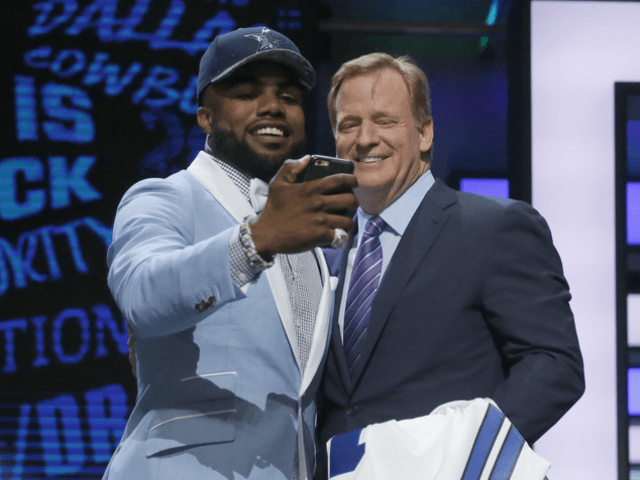For months, Cowboys Owner Jerry Jones has claimed that the NFL had “no evidence” that his star running back Ezekiel Elliott was guilty of domestic violence. Well, in light of some recent revelations, it appears that Jones might have been right. It also appears that the NFL didn’t really seem to care.
According to a report from ESPN’s Dan Graziano, Kia Wright Roberts, the NFL’s Director of Investigations and the only league official to interview Elliott’s accuser Tiffany Thompson, testified that based on her investigation she would not have recommended disciplinary action against Elliott. The NFLPA, and Elliott, are now crying foul because the NFL issued its six-game suspension of Elliott without seeking Roberts’ input.
According to Graziano:
The NFLPA believes it has a strong case for challenging Ezekiel Elliott’s suspension based on what it perceives as serious flaws in the NFL’s investigative process, according to a source familiar with this week’s appeal hearing. According to the source, Kia Wright Roberts, the NFL’s Director of Investigations, testified Tuesday that she was the only NFL employee who interviewed Elliott’s accuser, Tiffany Thompson, during the investigation. Roberts further testified, according to the hearing transcripts, that she would not have recommended discipline for Elliott based on her findings and that she was not included in the part of the process where the committee that investigated the Elliott matter recommended discipline to commissioner Roger Goodell.
On Wednesday at the Elliott appeal hearing, appeals officer Harold Henderson heard testimony from Lisa Friel the former New York City prosecutor who now investigates domestic violence cases for the NFL. Friel’s testimony corroborated that of Roberts, and the part of that testimony with which the NFLPA took issue was that commissioner Roger Goodell imposed the six-game suspension without Roberts’ input with regard to appropriate discipline.
Roberts was part of the committee that wrote the 160-page report on its investigation into Elliott’s case, but that report did not include a specific recommendation of discipline. A different committee, which included some but not all members of the original investigating group, met with Goodell to discuss discipline based on the report. Roberts was not asked to be part of that meeting, according to her testimony and that of Friel. As a result, the union concluded that the process by which the NFL arrived at a six-game suspension for Elliott encountered significant flaws somewhere between the investigation itself and the ultimate decision to suspend.
The concerns about the NFL’s investigative process in this matter could form the basis for a court challenge aimed at getting Elliott on the field for the Cowboys’ Week 1 game against the Giants. If the union files a suit seeking an injunction that would vacate the suspension, Elliott could potentially be allowed to play while the case is working its way through the courts.
That court challenge didn’t take very long. On Thursday night the NFLPA, and Elliott, filed suit against the NFL in a federal district court in Plano, Texas.
It seems clear that the NFL must answer one, very important question: if the league didn’t consider the input of the only person to interview Elliott’s accuser, especially considering she says she would not have recommended disciplinary action, then on what basis did they suspend Elliott?
One also must wonder why the league didn’t consider Roberts input? Was Roger Goodell so determined to suspend Elliott and avoid a Ray Rice redux, that he excluded anyone who might try to talk him out of it?
It also merits mention, though it shouldn’t, that the investigator who says Elliott should not be punished is a woman. While, in a perfect world, only facts and evidence should matter. The fact that someone likely to be sympathetic with the accused is saying that there should be no disciplinary action, will probably carry some weight in court.
However, all we know for sure is that for the second consecutive year a high-profile NFL disciplinary action is on its way to becoming a federal case. Maybe it’s time President Trump and Congress consider opening the NFL Circuit Court of Appeals?

COMMENTS
Please let us know if you're having issues with commenting.